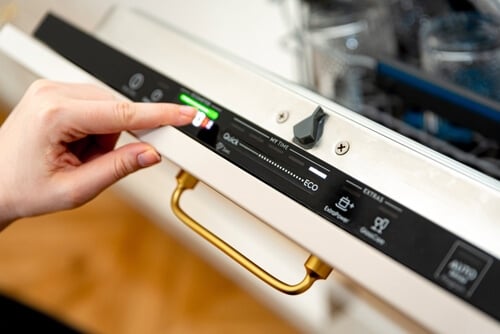As household boilers, gas fires and most central heating systems use gas, leaks do sometimes occur.
And it's horror stories of gas explosions that can leave some people confused and a little worried. So, what do you do if you think you smell gas in your house? These tips should help you out.

What should I do if I smell gas in my house?
- Don't turn electrical appliances off or on
- Ventilate the property
- Turn gas off at the meter
- Evacuate
- Call for professional help
- Tell your neighbours
- Wait for the all clear
1. Don't turn any electrical appliances off or on
Don’t operate any electrical switches. This includes flicking on a light switch or turning one off, because they could create sparks. It might sound obvious, but don't create any flames either.
2. Ventilate the property
Open windows and external doors immediately to allow the gas to disperse as quickly as possible.
3. Turn gas off at the meter if safe to do so
Not sure where the meter is? Then make it a priority to find out. Call your gas supplier if you need help locating it.
If you live above a commercial property, speak with the owner to find out where the meter is kept. And work out a plan for what to do if you smell gas when the business is closed.
To switch off the gas, you turn the lever so it's at 90 degrees to the gas pipe, closing the valve.
4. Evacuate
Make sure everyone in the building leaves immediately.
5. Call for professional help
Don’t attempt to sort the problem out yourself - call for suitably qualified help immediately.
Phone the National Gas Emergency Service on 0800 111 999.
6. Tell your neighbours
Let your neighbours know if you think they may be affected by the leak – it’s better to be safe than sorry.
7. Wait for the all clear
If you’ve evacuated the premises, don’t let anyone other than the engineer back into the property. Wait to be given the all clear before going back inside.
If you feel unwell, it's best to visit your GP or hospital. Let them know about the gas leak so they can treat you accordingly.
How to check for gas leaks in your house
Other than smelling gas, here are some ways you might be able to detect a gas leak in your house:
- If you have a gas hob the flame may be weaker
- You may hear hissing sounds from pipes or appliances
- You may see your gas usage has gone up unexpectedly
- Your plants are dying
- You feel unwell
If you think you know where a leak might be coming from, you can perform the 'bubble test'. This involves applying a soapy solution to the area you suspect the leak is coming from - if small bubbles appear, there's a leak.
What does gas smell like?
Energy providers add a smell to the gas supply so you're able to sniff out a gas leak straight away. So always be aware of the smell of gas.
The chemical added to gas - mercaptan - makes it smell like rotten eggs or smelly socks.
Gas leak symptoms
Your body may also react to the presence of leaked gas and you may start to feel unwell.
According to Healthline, gas leak symptoms can include:
- Dizziness
- Fatigue
- Nausea
- Headaches
- Irregular breathing
If you find that your symptoms get worse when you're in the house but ease off when you leave, you may have a gas leak.
If you have gas leak symptoms but can't smell any gas, there may be a carbon monoxide leak.
To see the full list of symptoms for carbon monoxide poisoning, read this guide from the NHS.
How to prevent gas leaks
Make sure that your appliances are installed and serviced by a Gas Safe-registered engineer.
If you don't already have one, install a carbon monoxide detector in your home. Unlike domestic gas, you can't smell carbon monoxide, and it can be fatal.
It might be worth investing in a portable gas detector too.
Are gas leaks covered by home insurance?
You need to check the specific details of your home insurance policy, but many insurers cover damage to the building in the event of a gas explosion. The same could apply to your possessions if you have contents insurance cover as well.
A standard insurance policy is unlikely to cover the cost of repair to wherever the leak is, for example a faulty boiler. For this, you need a home emergency cover policy.







